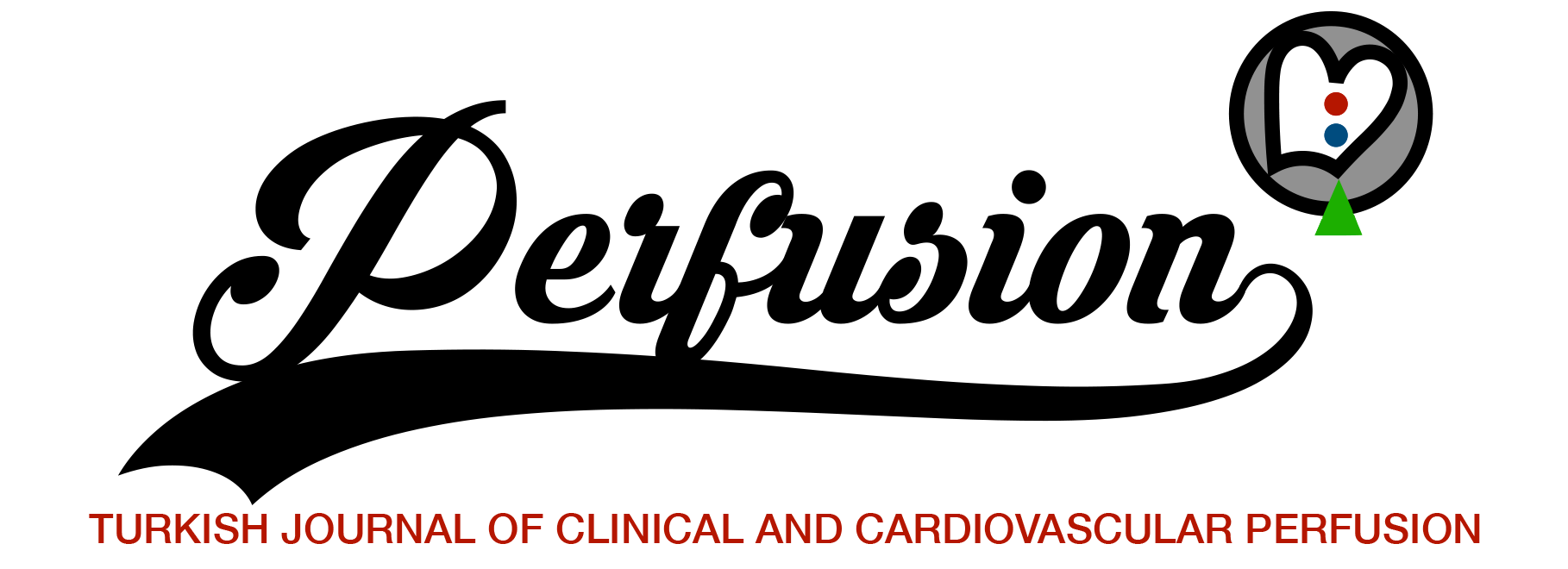ABSTRACT
Conclusion:
Further large-scale studies are needed to determine the clinical, biochemical, and hemodynamic effects of colloid and crystalloid use in the postperfusion period. The results suggest that close monitoring of drainage is necessary in patients who receive crystalloid and colloid in the prime solution.
Results:
No statistically significant difference was found between the use of crystalloid and colloid in prime solution.
Materials and Methods:
Coronary artery bypass graft surgeries performed at the Department of Cardiovascular Surgery, Kahramanmaraş Necip Fazıl City Hospital were retrospectively examined. A total of 100 patients were included in the study, and preoperative, intraoperative, and postoperative data on the techniques used were analyzed retrospectively. Patients who received colloid and those who did not received colloid in the prime solution were compared in terms of blood and blood product usage, hematocrit, drainage volume, and activated clotting time at 24 h after surgery.
Objective:
To investigate the effect of prime solutions used in cardiac surgery on blood parameters.
Keywords:
Blood transfusion, bypass, prime solution, crystalloid, colloid
References
1KDIGO. KDIGO 2012 Clinical Practice Guideline for the Evaluation and Management of Chronic Kidney Disease. Kidney Int Suppl 2013. Available from: https://kdigo.org/wp-content/uploads/2017/02/KDIGO_2012_CKD_GL.pdf
2Kellum JA. Akute kidney injury. Crit Care Med 2008;36(4 Suppl):S141-5.
3Mancini E, Caramelli F, Ranucci M, Sangiorgi D, Reggiani LB, Frascaroli G, et al. Is time on cardiopulmonary bypass during cardiac surgery associated with acute kidney injury requiring dialysis? Hemodial Int 2012;16(2);252-8.
4Avcı Işık S. Coronary Artery Diseases Surgery and Nursing Care. Turkiye Klinikleri J Surg Nurs-Special Topics 2018;4(1):8-19.
5Karadakovan A, Aslan Eti F. Dahili ve Cerrahi Hastalıklarda Bakım. 3. Baskı, İstanbul: Akademisyen Kitabevi, 2014.
6Damar E, Aksun M, Girgin S, Göktoğan T, Yılmaz E, Aran G, et al. A comparison of the hemodynamic, metabolic, renal and hemostatic effects of the use of Ringer solution and adjuvant 6% hydroxyethyl starch 130/0.4 as a pump prime solution in coronary artery bypass grafting. Turk Gogus Kalp Dama 2012;20(1):22-31.
7Yıldız F, Karakoç E. Fluid Replacement in Treatment of Hypovolemia and Shock: Crystalloid and Colloids. Archives Med Rev 2013;22(3):347-61.
8Eising GP, Niemeyer M, Günther T, Tassani P, Pfauder M, Schad H, et al. Does a hyperoncotic cardiopulmonary bypass prime affect extravascular lung water and cardiopulmonary function in patients undergoing coronary artery bypass surgery? Eur J Cardiothorac Surg 2001;20(2):282-9.
9Jansen PG, te Velthuis H, Wildevuur WR, Huybregts MA, Bulder ER, van der Spoel HI, et al. Cardiopulmonary bypass with modified fluid gelatin and heparin-coated circuits. Br J Anaesth 1996;76(1):13-9.
10Kuitunen AH, Hynynen MJ, Vahtera E, Salmenperä MT. Hydroxyethyl starch as a priming solution for cardiopulmonary bypass impairs hemostasis after cardiac surgery. Anesth Analg 2004;98(2):291-7.
11Ünlü Y, Ateş A, Tekin S, Ceviz M, Becit N, Kuşkay S, et al. Ekstrakorporeal dolaşımın ve farklı priming solüsyonlarının hemostaz üzerine etkileri. GKDC Dergisi 1998;6:310-7.



